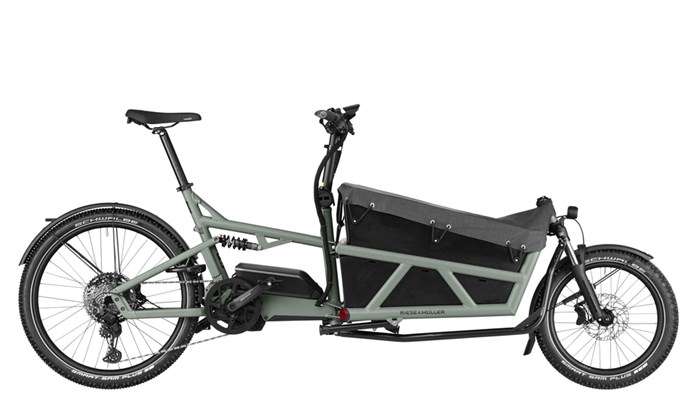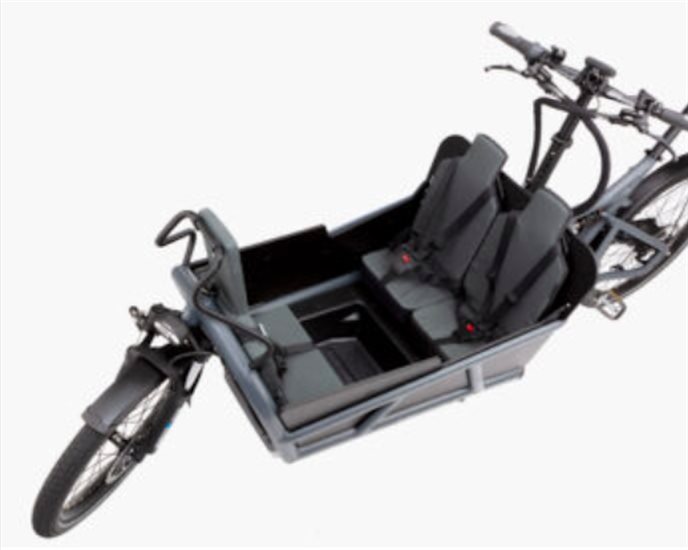An ideal ride for the car-free family in Kamloops, Okanagan

Parking for cars is a major cost in new housing.
That’s why many developers lobby city councils for fewer or smaller parking spots.
But, really, how feasible is it to get around Kamloops or Okanagan cities without a car for shopping or taking the kids to school?
It is quite feasible with the emerging trend to cargo e-bikes.
“We’re seeing it just beginning,” Sheldon Smith, sales manager for Kelowna E-Ride told iNFOnews.ca. “It just started in last couple of months."
It’s generally younger families, under the age of 40, who have shown an interest and only two cargo e-bikes have been sold in the Kelowna store to date.
It has branches in Kamloops and other Okanagan cities but only stocks the bikes in Kelowna, so far.
READ MORE: New car-free housing in Victoria helps save money and the planet
There’s only one cargo bike left in stock in Kelowna but more are coming early in the new year.
“We’re really looking to pushing this in 2023, 2024,” Smith said. “It’s a small but growing market. We think there’s lots of potential in the future.”
As with other e-bikes, they’re not cheap and get more expensive as the quality goes up.
An entry-level e-bike cost about $1,500 with prices going up from there. Cargo e-bikes are generally $1,000 more.
The two sold by Kelowna E Ride were at higher end, in the $9,000 to $17,000 range.
Businesses can get rebates of up to 33% of the cost through Plug In B.C.’s Specialty Use Vehicle Incentive.
The cargo bikes come in a variety of styles.
So far Kelowna E Ride has only sold rear carrier bikes but will be getting front loading bikes by late January or early February.
Passenger kits can be purchased to carry kids to school as well as cargo. The bikes can carry 250 pounds or more, along with the driver.
There are also lower priced tricycles for those who want greater stability.
Not that the two-wheelers aren’t stable.
“When they’re empty, they feel like you’re riding a normal bicycle but just a bit heavier,” Smith said. “When loaded up and you’re going in a straight line it feels very stable. It’s the lean-over weight where you feel it a bit. Getting off and on or getting started can be a little bit more of a challenge but you get used to it.”
The cargo bikes weigh about 20 pounds more than regular e-bikes, when empty.
Smith was promoting the Riese and Muller brand because of its high quality.
“One reason we like the Rieser and Muller models is because they have full suspension front-loading e-bikes,” he said. “That means you’ve got front suspension and rear suspension and, when you’re carrying a heavy load, it really helps with traction and control and safety, especially when you get up to higher speeds and you’re carrying a heavy load. It’s a lot safer to have full suspension which keeps your tires connected to the ground. It always keeps a contact point on the ground even in pot holes and dirt trails.”
There are basically two types of drive trains on the cargo bikes.
The less expensive models use chains that need to be replaced every 1,000 kilometres or so.
The Rieser and Muller models have a belt that should last 30,000 km even with heavy loads. They cost $100 to $150 to replace.
All the e-bikes are regulated to a maximum speed of 32 km/hr, which is the legal limit for street use. Otherwise, ICBC will require insurance and drivers licences.
For more information, check out the Kelowna E Ride website, here. Cargo e-bikes will be stocked in the company’s other stores next year.
To contact a reporter for this story, email Rob Munro or call 250-808-0143 or email the editor. You can also submit photos, videos or news tips to the newsroom and be entered to win a monthly prize draw.
We welcome your comments and opinions on our stories but play nice. We won't censor or delete comments unless they contain off-topic statements or links, unnecessary vulgarity, false facts, spam or obviously fake profiles. If you have any concerns about what you see in comments, email the editor in the link above.




